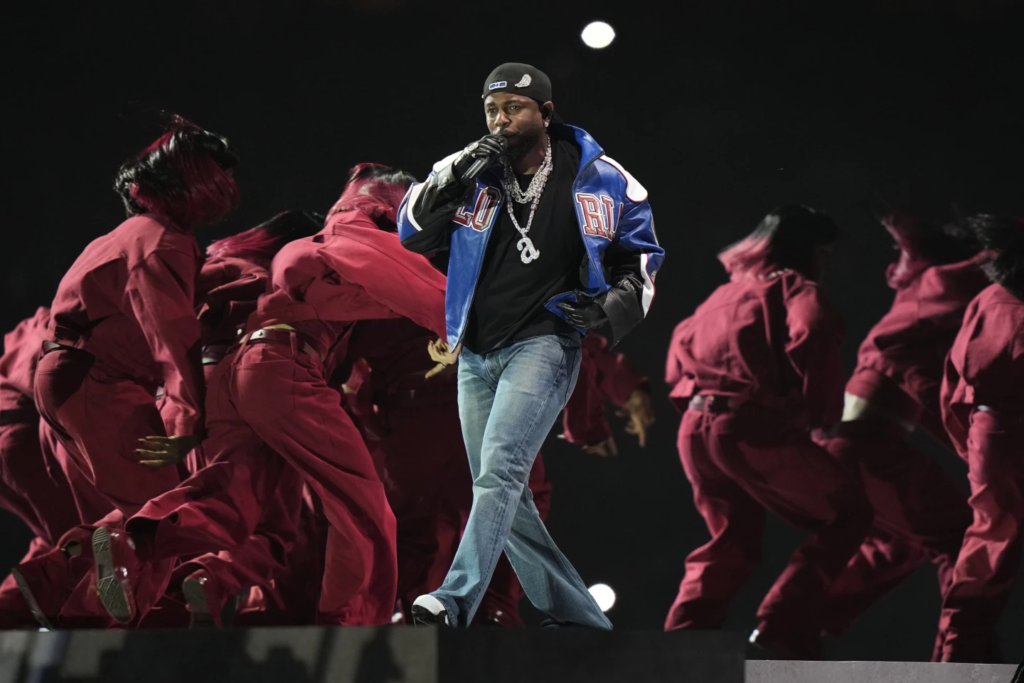This Just In – The Super Bowl as an artistic forum did not disappoint.
New Orleans is a city with deeply felt African American culture in every aspect of life there. Food, music, sports, politics … almost everything in New Orleans is led by African Americans, thank goodness.

Kendrick Lamar performs during halftime of the NFL Super Bowl 59 football game between the Kansas City Chiefs and the Philadelphia Eagles, Sunday, Feb. 9, 2025, in New Orleans. (AP Photo/Frank Franklin II)
I visited NOLA before Katrina and watched the news coverage of that tragedy along with the rest of the country. Many might forget that as a natural disaster turned into a compounded tragedy of mismanagement, it quickly became racial and political with fingers pointed in every direction and plenty of blame to go around.
I watched the game on Sunday, nearly 20 years after Katrina and was happy to see the massive representation of its host city, back into its glory. Fantastic.
As I watched the halftime show and read about it afterwards, I came to appreciate the protest poetry of hip hop and the in-your-face nature of what Kendrick Lamar was putting in front of the audience of one (the attention-demanding president). This is what art does and it’s definitely what poetry can do.
In the early 19th century George Moses Horton, born into slavery, began composing poems. He would sell them at the Chapel Hill farmer’s market. Some of these were romantic poems that he sold to male students from UNC.
He was not deterred by being unable to buy his freedom. Horton sustained himself by making a living as a poet. In the antebellum years, in a slave state (North Carolina) this Black man made a living writing and selling poetry. This was a form of resistance all its own to say nothing of entrepreneurial accomplishment.
After the civil war, now a free man, he settled in Philadelphia for the balance of his life. Horton was an elegant poet, impressively educated by way (I believe) of his own curiosity and determination. His work is disturbingly relevant today. Read, for example, his poem “Weep” about the grief and loss of a nation at war and you’ll find connection with the deeply felt loss of belief in the American system of self-governance and civility in public life.
I look to Horton and find inspiration and determination in the story of his life. He achieved what he did under impossible repression and denial of basic human rights. What we are called upon to do in the face of a corrupt and incompetent administration is to stay focused on our own humanity and commitment to preserving, protecting and defending the Constitution that most of us want to continue as our bulwark against tyranny.
Continuing our civility and decency at every other level of government is how we defend our republic. Telling these stories of our ancestors and their sheer greatness is an important form of resistance to the corrosive, degrading effect of unserious people having taken power at the highest levels.
Our community, thankfully, lifts up great artists like Horton, Pauli Murray and Jaki Shelton Green, our state’s poet laureate and so many more. Our resistance can include supporting libraries and in-person forums to facilitate constructive discussion of divergent views. The face-to-face element is important and irreplaceable when it comes to the impact of political criticism.
That said, take an action to push back against intolerance and indignity. Turn off the TV. Open a book of poetry and dive in.
 Jean Bolduc is a freelance writer and the host of the Weekend Watercooler on 97.9 The Hill. She is the author of “African Americans of Durham & Orange Counties: An Oral History” (History Press, 2016) and has served on Orange County’s Human Relations Commission, The Alliance of AIDS Services-Carolina, the Orange County Housing Authority Board of Commissioners, and the Orange County Schools’ Equity Task Force. She was a featured columnist and reporter for the Chapel Hill Herald and the News & Observer.
Jean Bolduc is a freelance writer and the host of the Weekend Watercooler on 97.9 The Hill. She is the author of “African Americans of Durham & Orange Counties: An Oral History” (History Press, 2016) and has served on Orange County’s Human Relations Commission, The Alliance of AIDS Services-Carolina, the Orange County Housing Authority Board of Commissioners, and the Orange County Schools’ Equity Task Force. She was a featured columnist and reporter for the Chapel Hill Herald and the News & Observer.
Readers can reach Jean via email – jean@penandinc.com and via Twitter @JeanBolduc
Chapelboro.com does not charge subscription fees, and you can directly support our efforts in local journalism here. Want more of what you see on Chapelboro? Let us bring free local news and community information to you by signing up for our newsletter.

